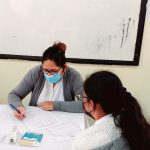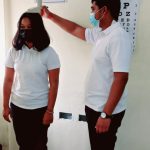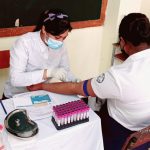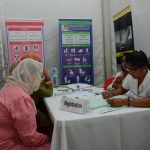Early detection and screening of NCD and Health Promotion
NCD intervention programmes focusing on primary prevention of diseases and their risk factors in the community and at worksites has been reengineered. Existing programmes which are comprehensive and multi-sectoral are being sustained to favour an enabling environment for the adoption of a healthy lifestyle. NCD Screening for early detection of the diseases, their risk factors and complications has been further strengthened to ensure that the whole population, in particular those at risk, is screened on a regular basis. A diabetes risk score form is used to evaluate the criteria to perform HbA1c test for glucose test. About 40,000 persons are targeted to be screened annually.
Screening programme for student of Secondary School
Screening programme for students of Secondary School has been introduced in February 2007 and is being maintained. About 45,000 students of Grade 7, Grade 9 and Grade 12 from secondary schools throughout the island are targeted to be screened annually.
Breast and Cervical Cancer Screening Programme
Breast and Cervical Cancer Screening Programme has been equally revised and the age for screening has been changed from 30 to 60 years to 25 to 65 years thus targeting more women at risk. The programme is for married or sexually active women and is in line with the guidelines laid by experts for early detection and treatment. Liquid based cytology has been introduced which is being used instead of conventional cytology (microslide-smear) for cervical cancer screening. Annually, some 20,000 women are targeted to be screened for breast and cervical.
As part of NCD screening programme, Artificial Intelligence Electrocardiography (AI ECG) has been introduced to conduct heart diagnosis. A cardiac risk score form is used to find people who are more prone to have cardiac problems and are referred to do the AI ECG. The test proposes a new method which is similar to an ECG but it is uncomplicated, safe and inexpensive to use and yet precise with a high level of informative value. This new method is based on the process of vector cardiography. Similar to an ECG, the electrical activity of the heart is recorded – but with one crucial difference: where the ECG only records two dimensions, an additional electrode on the back in vector cardiography ensures data is recorded in three dimensions.
The organization of workshops, talks, health education and counselling sessions, cooking demonstration and adoption of healthy lifestyle are being given great importance through community mobilisation.






